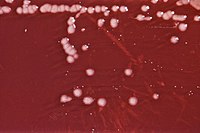
Immobilization of the Aspartate Ammonia‐Lyase from Pseudomonas fluorescens R124 on Magnetic Nanoparticles: Characterization and Kinetics
Sign Up to like & getrecommendations! Published in 2022 at "ChemBioChem"
DOI: 10.1002/cbic.202100708
Abstract: Aspartate ammonia‐lyases (AALs) catalyze the non‐oxidative elimination of ammonia from l‐aspartate to give fumarate and ammonia. In this work the AAL coding gene from Pseudomonas fluorescens R124 was identified, isolated, and cloned into the pET‐15b… read more here.
Keywords: pseudomonas fluorescens; aspartate ammonia; magnetic nanoparticles; ammonia ... See more keywords

Potential modes of action of Pseudomonas fluorescens ZX during biocontrol of blue mold decay on postharvest citrus.
Sign Up to like & getrecommendations! Published in 2019 at "Journal of the science of food and agriculture"
DOI: 10.1002/jsfa.10079
Abstract: BACKGROUND The application of chemical fungicides is currently the main method to control postharvest decay of fruits and vegetables. However, public concern has been growing towards the effect of fungicides on food safety, human health,… read more here.
Keywords: pseudomonas fluorescens; decay; microscopy; blue mold ... See more keywords

Conversion of phenylglycinonitrile by recombinant Escherichia coli cells synthesizing variants of the arylacetonitrilase from Pseudomonas fluorescens EBC191
Sign Up to like & getrecommendations! Published in 2019 at "Applied Microbiology and Biotechnology"
DOI: 10.1007/s00253-019-09957-y
Abstract: The conversion of phenylglycinonitrile (2-aminophenylacetonitrile) by Escherichia coli strains was studied, which recombinantly expressed the arylacetonitrilase (NitA) from Pseudomonas fluorescens EBC191 and different nitrilase variants with altered reaction specificities. The whole-cell catalysts which formed the… read more here.
Keywords: phenylglycinonitrile; escherichia coli; conversion phenylglycinonitrile; coli ... See more keywords

Pseudomonas putida and Pseudomonas fluorescens Influence Arabidopsis Root System Architecture Through an Auxin Response Mediated by Bioactive Cyclodipeptides
Sign Up to like & getrecommendations! Published in 2019 at "Journal of Plant Growth Regulation"
DOI: 10.1007/s00344-019-09979-w
Abstract: Plant growth-promoting rhizobacteria modulate root development through different mechanisms. This work was conducted to evaluate the effects of root colonization by Pseudomonas putida and Pseudomonas fluorescens in biomass production, lateral root formation, and activation of… read more here.
Keywords: response; putida pseudomonas; root; pseudomonas putida ... See more keywords

Co-inoculation of Arizona cypress with arbuscular mycorrhiza fungi and Pseudomonas fluorescens under fuel pollution
Sign Up to like & getrecommendations! Published in 2019 at "Mycorrhiza"
DOI: 10.1007/s00572-019-00888-0
Abstract: Air pollution in metropolitan areas of Iran has negatively impacted establishment, growth, and development of many woody plant species, threatening the health of urban forest species. This study was designed to investigate the effects of… read more here.
Keywords: arizona cypress; inoculation; pollution; fuel pollutants ... See more keywords

Complete genome sequence of PFP1, a novel T7-like Pseudomonas fluorescens bacteriophage
Sign Up to like & getrecommendations! Published in 2018 at "Archives of Virology"
DOI: 10.1007/s00705-018-3979-3
Abstract: The complete genomic sequence of Pseudomonas fluorescens bacteriophage PFP1, isolated from sewage samples collected in Liaoning Province, China, were sequenced in this study and found to be 40,914 bp long. The PFP1 genome is composed… read more here.
Keywords: fluorescens bacteriophage; pseudomonas fluorescens; genome; pfp1 ... See more keywords

Conversion of aliphatic nitriles by the arylacetonitrilase from Pseudomonas fluorescens EBC191
Sign Up to like & getrecommendations! Published in 2018 at "World Journal of Microbiology and Biotechnology"
DOI: 10.1007/s11274-018-2477-9
Abstract: The conversion of aliphatic nitriles by the arylacetonitrilase from Pseudomonas fluorescens EBC191 (NitA) was analyzed. The nitrilase hydrolysed a wide range of aliphatic mono- and dinitriles and showed a preference for unsaturated aliphatic substrates containing… read more here.
Keywords: nitriles arylacetonitrilase; aliphatic nitriles; arylacetonitrilase pseudomonas; pseudomonas fluorescens ... See more keywords

Effects of organophosphate pesticides on siderophore producing soils microorganisms
Sign Up to like & getrecommendations! Published in 2019 at "Biocatalysis and Agricultural Biotechnology"
DOI: 10.1016/j.bcab.2019.101359
Abstract: Abstract The aim of the current study was to evaluate the effects of four organophosphate pesticides on the siderophores producing soil microorganisms or plant growth promoting rhizobacteria (PGPR). Individual effects of acephate, glyphosate, monocrotophos and… read more here.
Keywords: siderophore producing; soils microorganisms; organophosphate pesticides; pesticides siderophore ... See more keywords

Formulations of Pseudomonas fluorescens and Burkholderia pyrrocinia control rice blast of upland rice cultivated under no-tillage system
Sign Up to like & getrecommendations! Published in 2020 at "Biological Control"
DOI: 10.1016/j.biocontrol.2019.104153
Abstract: Abstract Leaf blast caused by Magnaporthe oryzae is among the major diseases that limit rice productivity in the world, and control of the disease occurs, basically, through the application of fungicides. Control methods such as… read more here.
Keywords: blast; rice; control; rice blast ... See more keywords

Predictive modeling of Pseudomonas fluorescens growth under different temperature and pH values
Sign Up to like & getrecommendations! Published in 2017 at "Brazilian Journal of Microbiology"
DOI: 10.1016/j.bjm.2016.12.006
Abstract: Meat is one of the most perishable foods owing to its nutrient availability, high water activity, and pH around 5.6. These properties are highly conducive for microbial growth. Fresh meat, when exposed to oxygen, is… read more here.
Keywords: predictive modeling; temperature; modeling pseudomonas; pseudomonas fluorescens ... See more keywords

Proteomic analysis of the food spoiler Pseudomonas fluorescens ITEM 17298 reveals the antibiofilm activity of the pepsin-digested bovine lactoferrin.
Sign Up to like & getrecommendations! Published in 2019 at "Food microbiology"
DOI: 10.1016/j.fm.2019.02.003
Abstract: Pseudomonas fluorescens is implicated in food spoilage especially under cold storage. Due to its ability to form biofilm P. fluorescens resists to common disinfection strategies increasing its persistance especially across fresh food chain. Biofilm formation… read more here.
Keywords: pseudomonas fluorescens; food; biofilm; proteomic analysis ... See more keywords